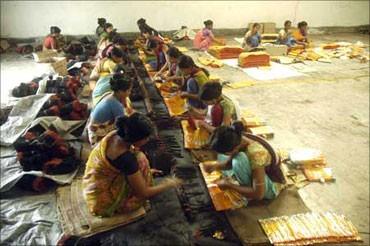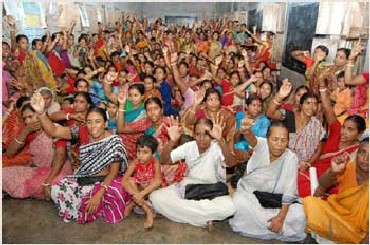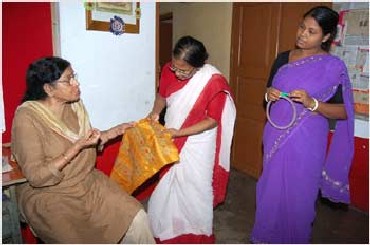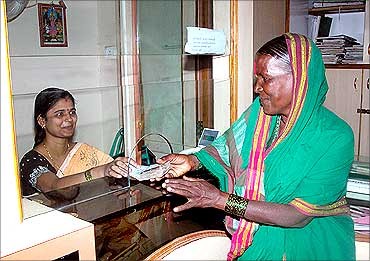Photographs: Reuters Sreelatha Menon in New Delhi
As Lakshmi sits outside her door and talks, her fingers move fast on a piece of cloth she is sewing with a needle and a coloured thread. The faster she completes stitching, the more the pieces she can finish in the day.
These are tiny bits and pieces, which would be joined together later and stuffed with cotton to form decorative elephants.
More women in the neighbourhood and in the embroidery centre of Self-Employed Women's Association (SEWA) in New Ashok Nagar, Delhi, where Lakshmi resides, are working on sewing beads and laces to finish decorative elephants for an order from a large export house.
She finishes her cooking and washing, sending her three children off to school, bringing them back and feeding them, before going back to sewing in the late afternoon till her husband returns from work.
The man works as a supplier of material for a gas agency and other sundry shops in the neighbourhood.
...
SEWA promotes work-from-home option
Photographs: Cheryl Ravelo/Reuters
Lakshmi makes enough money for her personal needs - Rs 600-1,000 - depending on the amount and the kind of work she gets from her daily visits to the SEWA centre.
In fact, if she were to go there and spend the day, she could easily make Rs 3,700 being paid on a daily basis for the large orders that come sometimes.
SEWA Delhi's CEO Archana is persuading women like Lakshmi to come and learn skills such as aari, which could get her higher rates for each piece she does.
If she gets Rs 12 for each piece of simple stitching, she can earn almost double the money for a piece involving aari work.
It is labourious and earns very little, given the rates export houses pay. SEWA takes 10 per cent, but the contractors who they have sought to replace take away almost 50 per cent.
...
SEWA promotes work-from-home option
So, the numbers moving towards SEWA from contractors are swelling. The embroidery project now has 500 women in three centres in Delhi.
The women are part of a producer company and the CEO's job is mainly to get orders from suppliers to top brands.
SEWA has the advantage of having been around for the last four decades and the top brands are willing to introduce it to their suppliers in Delhi to get orders.
Some include Newlook Next, Monsoon and Gap, while it is also in talks with Marks & Spencer and Top Shop, according to the NGO coordinator, Sanjay Kumar.
These are baby steps yet for this producer company, as the orders that came last year were worth Rs 27 lakh. This means it has to create a more dynamic demand and supply chain.
The low rates make the task even more difficult, while the fact that top brands can pay only so much adds to the irony of the situation.
...
SEWA promotes work-from-home option
The challenge now for the company is to satisfy newer buyers. Those involved with it realise in their short journey since they started last year, the brands can introduce them to suppliers and export houses only once.
And, the company is now conducting training for workers through visits to export houses, acquainting them with the entire production exercise. For the women getting a bagful of work to be completed in a day does not come easy either. They have to demonstrate their ability to execute the work to the supervisor at the centre.
It is tough, but good, says Sandhya, a home-based worker with SEWA. She is a veteran, having done the same work for contractors for years after migrating to Delhi from Bihar.
During summers, supplies are low, she adds while trying to stuff an embroidered elephant with cotton.
...
SEWA promotes work-from-home option
But, she beams when asked about her account with SEWA. She has been saving money for the last eight months and it is a big sense of security for her.
SEWA's producer company, Ruaab, targets orders worth Rs 1 crore by the year-end and that could help it break even, says Kumar.
"We are all set to expand the network of home-based workers to 2,500 in two years, for only large numbers can give us bargaining power with export houses," he says.
As buyers are influenced by the low rates offered by Bangladesh and China, one is swept away in the race to the bottom, says Kumar, underlining his dilemma.
"We are entering global platforms to demand better rates. It is a slow race for equity," he concludes.







article